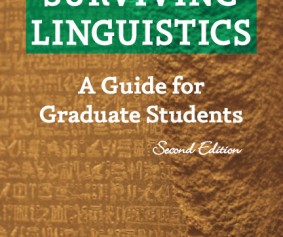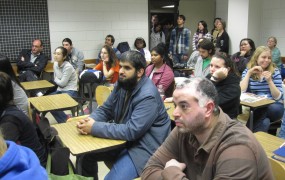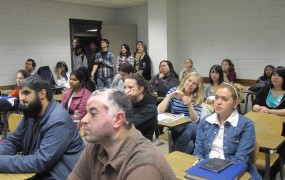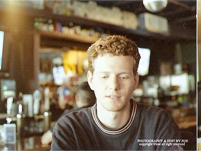Surviving Linguistics: A Guide for Graduate Students
Tuesday, January 12th, 2010 @ 10:37AM
by Monica Macaulay
–Review by Tyler McPeek
The very existence of this book can be both a convenient text selection for grad research class professors in linguistics departments and an encouragement and a comfort for anyone working in the field. It is the only book of its kind and therefore not facing any competition. In our department, every student received a copy as part of their graduate research class. It’s a thin reader that is meant to serve as a kind of training manual for the linguistics graduate student. The section “How to Write Like a Linguist” is useful and prudent. Many of the sections could really appeal to any graduate student of the liberal arts or social sciences. The sections that are specific to linguistics student face two primary challenges. There are two challenges that a printed book of this kind faces. The first is that the material goes out of date quickly. Most of the resources mentioned in the book are online and the links and resources change so quickly that one is left to wonder if most of the information in this book wouldn’t better be presented online as well, where it could be updated frequently, with clickable links to outside resources, rather than having links to websites (some of which have changed their address, content, or simply don’t exist anymore) printed on the page in this traditional book form. The second challenge for a book like this is that most of the really important hurdles that one faces in trying to make their way through a linguistics program are more department-specific than they are field-specific. So, in terms of “surviving” the program, this is more about getting useful information from the senior students in your program and learning how to navigate successfully through your particular department and its unique challenges and faculty, than it is about “surviving” linguistics as a discipline. Having said that, most all of us face the same job market after graduation, and this book provides useful information things to keep in mind as you navigate through your program to ensure that you will have the best chance of finding a good job after you graduate. All in all, I would say that one would do better on a site like this one (FloridaLinguistics.com) than they would with this book for links to outside resources for linguists. On the other hand, for information about general graduate research methods and advice on writing and preparing yourself for the job market, I would say that a current version of this book would be a good choice. A book like this could be written many ways, and though I would have done it differently (by including more information about the discipline in context and different types of programs in the United States and internationally, for example), I think Macaulay did a decent job of providing a linguistics-specific manual for a required graduate research class in the United States.
Posted by floridalinguistics
Categories: Book Reviews, Tyler McPeek









